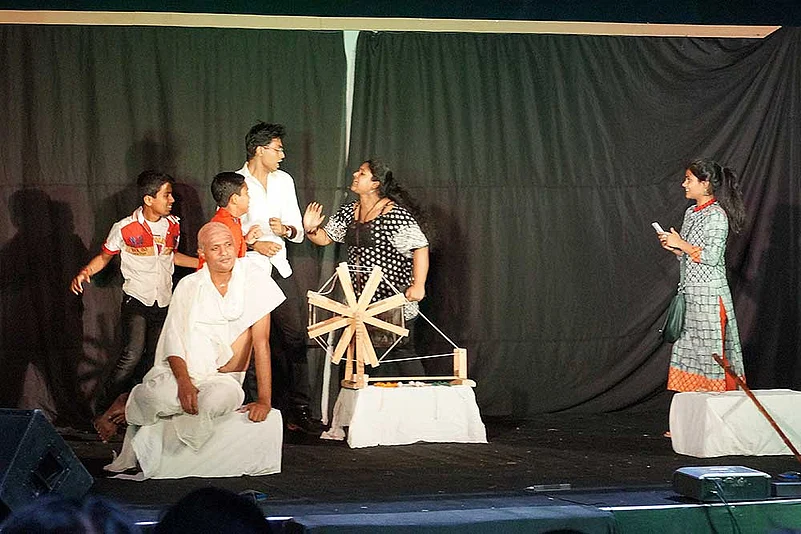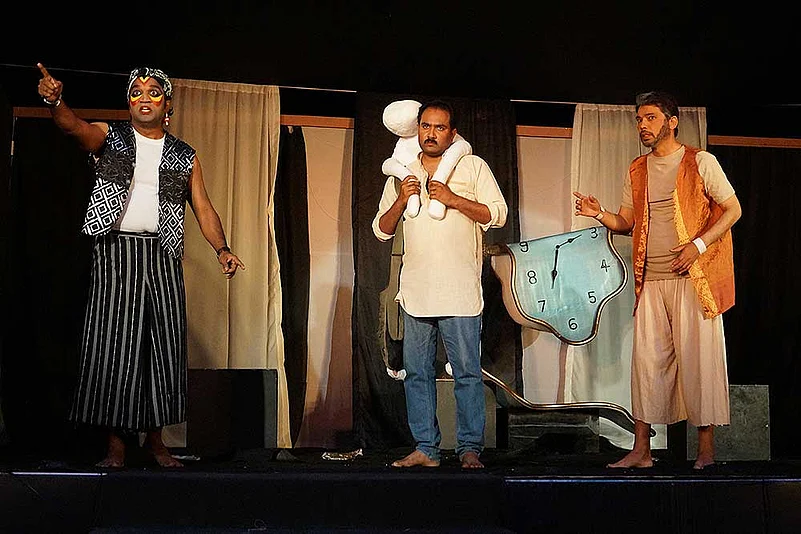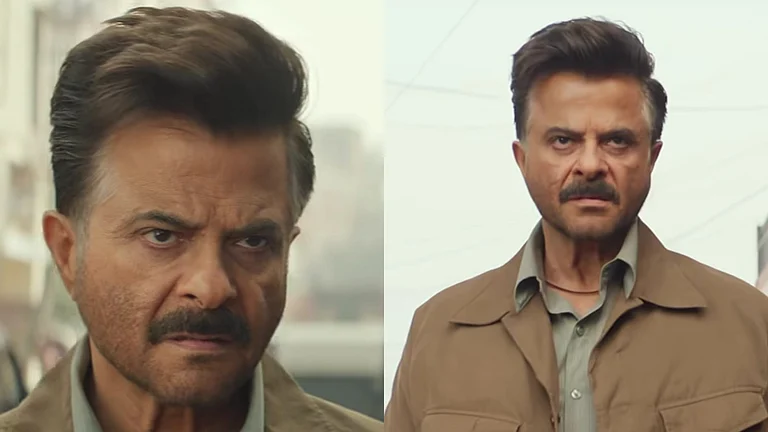The pangs of refugees from different parts of the world, a stage adaptation of a Bangla story by Satyajit Ray, a Purana story juxtaposed with contemporary situations, a plot woven around the famed 1931 painting by Spanist artist Salvador Dali, the present-day tensions of a teenage girl’s father…. The themes range across period and region, time and space.
No less than 28 short plays found presentation in a pioneering cultural event in the national capital, giving India the credit of finally getting a micro drama festival. Staged in nine languages on a competition basis, the day-long event brought in a motley gathering under a black marquee that was virtually an extension of the foliage of a tree at a landmark in the city.
Organised by Vriksh, a nascent threatre group based in Delhi, the first Thespis National Micro Drama Festival proved to enact quite a few of its chief mottos: promote innovative means of art creation, benefit underprivileged children and unite people for a cultural activity. The April 9 festival at the Indira Gandhi National Centre for the Arts featured 25 plays of ten minutes each vying for honours, while three other nano dramas adding to the concept of brevity. Unlike with skits, which are known to essay themes in a breezy way, the micro-drama plays at the festival moved beyond sarcasm and treated dense plots as well—with emotions banking on poignancy, desperation and protest.

Senior playwright Omchery N.N. Pillai, a patron of the 20-month-old Vriksh, points out that ten minutes is “not a very short time”, given the possibility of enriching the duration with content and form. “That way, a micro dama is a total experiment. The effort is like an adventure,” says the nonagenarian, a native of Kerala’s coastal Vaikkom. “It has the potential to shake the set norms one relates to theatre.”
National School of Drama director Waman Kendre, who was among the dignitaries to release the festival logo three months ago, finds ‘Thespis 2017’ as a significant initiative to provide new-age theatre initiatives. “It is a valuable platform to showcase outstanding works by eminent directors from various parts of our country,” he adds.
Theatre person Ajith G. Maniyan, a frontline organiser of Thespis 2017, is happy that the festival received a total of 42 entries from places as distant as the Middle East. “You can also take it as a de facto talent hunt in India’s theatre field,” adds Maniyan, an artiste with the Song and Drama Division under the Information and Broadcasting Ministry. “We learn that the only other place in the world that has a micro drama festival is Melbourne in Australia.”

By Sunday evening, awards were given away in the categories of best production (Mriga Trishna, Hindi), script (Kuldip Kunal), director (Manoj Yadav), actor (Anurag Kumar), actress (Anju Mattoo) and technician (Latin Ghai), besides special awards for acting (Tarundeep Arora and Ajitha Narayanan). The five-member jury comprised scholar-artistes Sohaila Kapur, Madhavi Menon, Antony Charles, Priyanandan and Sunita Bharati. The plays—a couple of them featured just one actor—staged were in Hindi, Malayalam, Odiya, Rajasthani, Urdu, Kashmiri and Tamil, Punjabi, while four were multi-language (including English). One of the three plays outside of the competition section spanned just 45 seconds.
Two plays in the category (both Hindi) threw light on the life of the blind—one of them even tending to give the morale that the world the visually-challenged conceives is more beautiful than what those around them get to see. Plots in other plays revolved around a gamut of social issues: rape, patriarchy, tradition-Vs-modernity, changing intra-family relations in a world of technological advancement, travails of old-age, the youngsters’ obsession with social media blurring their views about a more real world, life of kids in slums, casteism, gender-related attitudes and exploitation of children, among others.
Mahatma Gandhi, interestingly, came into focus in more than a couple of micro dramas—directly or subtly, while one play had its characters extending up to Pakistan and discussing the travails of an unintentional immigrant from that western neighbour to India.
Among others who wished success to the micro drama festival were Delhi deputy chief minister Manish Sisodia, Kerala CM Pinarayi Vijayan and that state’s Sangeetha Nataka Academy former secretary P.V. Krishnan Nair.
The Vrisksh, founded in mid-August 2015, has by itself staged a handful of plays—one of them based on late statesman V.P. Menon.


























